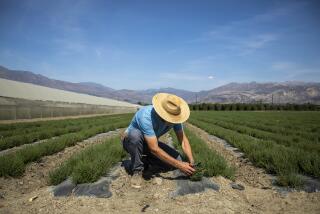Organic : Tales From Mother Gooch
“I know Mrs. Gooch’s could sell more organically grown produce if it were available,” says Sandra Gooch, founder of the chain of seven Southern California natural food stores that bears her name. Just 40% of the produce sold at Mrs. Gooch’s is organic.
If she had her way, all the produce at Mrs. Gooch’s would be grown without pesticides. Gooch, an outspoken advocate of organic foods, says only 1% of all the produce sold in the United States annually is organic and the demand is greater than that being produced--maybe five times as much.
“Where are the farmers?” she asks. “Where are the universities? Why aren’t they teaching these methods? Where is the government? Why aren’t they promoting this from an economic and health and social aspect?”
Gooch sold her stores earlier this year, but she remains with the company and today preaches the gospel of goodness. At her offices in Sherman Oaks, the walls are covered with oil paintings of a general store in a gentler era--before pesticides, herbicides and growth hormones--the targets of Gooch’s wrath today.
Those chemicals create health risks for some people and it was with those people in mind that Gooch, a victim of a near-fatal reaction to food additives, founded her chain of stores in 1977 to sell only items that are minimally processed and largely or completely free of artificial ingredients and preservatives.
“The government has misplaced its priorities,” she says, sitting in her spacious office. “Its work on prevention is infinitesimal. It wants to restrict information (about) and access to amino acids, vitamins and supplements, but it doesn’t address the problems of pesticides, herbicides and growth hormones.”
The Clinton Administration has changed some of that thinking. Two weeks ago, three federal agencies--the Environmental Protection Agency, the Food and Drug Administration and the Department of Agriculture--jointly announced a new effort to reduce the use of pesticides in the nation’s agriculture. And last week, the National Academy of Sciences released a report that focused on the effects on children of pesticides use in produce.
“It’s a good first step,” Gooch admits. “Parents are now going to wonder, ‘What is it that my child is eating? How can I give my child the safest food?’ And by asking these questions, demands will be made on the government to do more in this area. Parents need to communicate with their own community, with restaurateurs and with the markets, to let them know they are concerned, and that, if available, they would purchase this type of quality product--products grown in a sustainable manner, using integrated pest management techniques, grown without the use of pesticides.” She credits activists with pushing the government into greater dissemination of information on health issues. “We are told about eating more produce, more fiber and so forth,” she says. But she charges that major food producers are a lobby that dictates what kind of information is released.
Peter Roy, president and chief operating officer of Whole Foods Market Inc., the company that bought Mrs. Gooch’s. acknowledges that there’s a gap between the demand for organic products and the supply. Still, he says, “We see more people going into organic food production than in the past, which is a recognition of the growing demand.
“There are circumstances that cause us problems, such as the whole Alar scare of a few years ago. We had been paying $25 a box for organic apples and after Alar, that price rose to $75 a box. (But) the result is that there are now more organic apple growers than there were then.”
More to Read
Inside the business of entertainment
The Wide Shot brings you news, analysis and insights on everything from streaming wars to production — and what it all means for the future.
You may occasionally receive promotional content from the Los Angeles Times.










